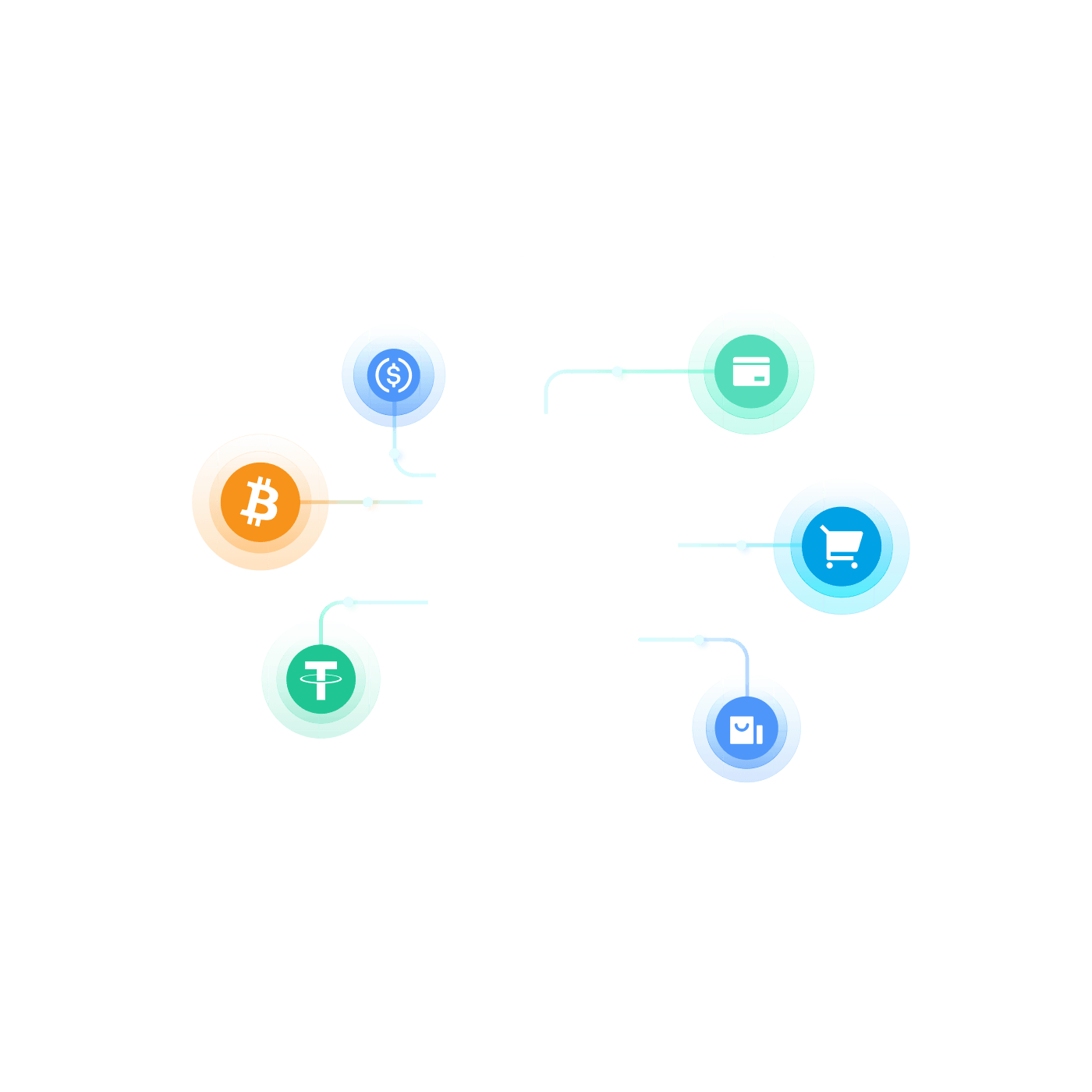ASEAN USD
Uniting ASEAN Fiat Currencies
Presenting the ASEAN USD (USDA), a practical digital stablecoin. Supported by secure and highly liquid assets, it upholds a 1:1 value peg to the US dollar.



Transforming The Way ASEAN Transacts
USDA for Users
For ASEAN residents and global travelers alike, USDA paves the way for real-life transactions and elevates digital currency to a legitimate medium of exchange.
USDA for Investors
Discover ASEAN's digital currency, a stable option backed by regional economies. Join our thriving community and grow alongside one of the world's fastest-growing economies.
USDA for Merchants
Elevate your business with USDA integration, offering customers a robust digital payment solution. Seamlessly tap into the billion-dollar crypto market.
The Fusion Of Web2 And Web3
Experience the power of ASEAN USD, enabling borderless real-world transactions. By linking the virtual and the tangible realms, We lay the groundwork for advancements in both the near and future times to come.



ASEAN Exchange Rates
Explore USDA's potential
Hop on Board
Join the community to explore USDA's potential. Connect with supportive peers who share your growth mindset.




Dive Into the Latest LADT News, Resources, and Weekly Updates
Blog
21 Nov, 2025
Why Stablecoins Are the New Backbone of Global Payments
When a payroll lands in employee wallets in seconds, or a sale clears across three continents with a single click, chances are, a stablecoin powered that transaction.If you’re not already accepting stablecoins, your competitors (and your customers) are moving ahead. Here’s why more platforms and merchants are making stablecoins part of their core payment strategy.What are Stablecoins?First, let’s understand what stablecoins are. Stablecoins are digital tokens designed to hold a steady value by being pegged to a traditional currency like the US dollar or euro. Unlike volatile cryptocurrencies such as Bitcoin or altcoins, stablecoins are backed by real-world assets, making them predictable and practical for business use. They run on public blockchains, can be sent or received by anyone with a compatible wallet, and settle in real time anywhere in the world, 24/7.From Niche Asset to Mainstream UtilityStablecoins were once viewed as a side project of crypto: a bridge between digital assets and traditional finance. This perception has shifted dramatically. As of 2025, the total supply has increased from $2.5 billion in 2019 to over $270 billion today. Now, what explains this meteoric growth?The answer lies in the friction businesses face with legacy payment systems: delays in cross-border settlement, hidden fees, lack of transparency, and reliance on intermediaries, which stablecoins solve all. Stablecoins offer a direct, programmable, and globally accessible digital currency that behaves like cash, but with the speed and reach of the internet.Why Businesses Are Embracing Stablecoins▪ Instant Settlement, Always-On CommerceTraditional international payments can take days to clear, often passing through multiple banks before reaching their destination. With stablecoins, settlement can happen within minutes, sometimes seconds, regardless of banking hours or national borders. This creates opportunities for companies to run real-time payrolls, enable just-in-time supply chain payments, or settle e-commerce transactions globally without waiting for wires to clear.▪ Predictability and Price StabilityUnlike most cryptocurrencies, stablecoins are pegged to fiat currencies such as the US dollar or euro, offering price predictability. This is why they are so attractive for merchants and platforms who need to reconcile payments, manage cash flow, and minimize exposure to volatility.New Markets, New CustomersIn countries facing inflation, capital controls, or limited access to banking, stablecoins are already becoming the default digital dollar. For example, in Latin America, 43.6% of users engage with crypto for daily spending or cross-border payments. These are families paying bills, freelancers getting paid, and businesses transacting across borders, no bank required.Lower Costs and Increased MarginsStablecoins can reduce transaction fees significantly, particularly for B2B payments. For example, sending USDC on Polygon can cost less than $0.10 per transaction, compared to 1.70-3.5% for card-based payments. For high-frequency or low-margin businesses, these savings are both material and repeatable.Programmable, Automated SettlementBecause stablecoins exist on open, programmable blockchains, companies can integrate payment logic directly into their platforms. This means that revenue sharing, instant settlement, compliance checks, and even loyalty rewards can be automated at the point of payment. No more batch processing or reconciliation delays.Regulation: The Missing Link is Now in PlaceFor years, regulatory uncertainty was the main barrier to stablecoin adoption. This is changing rapidly. In the U.S., two new landmark laws now provide a clear path forward: the GENIUS Act and the Clarity for Payment Stablecoins Act, both signed in 2025. Together, these laws establish a comprehensive federal framework for stablecoins, requiring 1:1 asset backing, mandatory audits, and ongoing disclosures. European businesses benefit from the Financial Services & Markets Act (UK, 2023), which classifies fiat-backed stablecoins as regulated payment instruments, while in Asia, Japan’s Stablecoin Law (2023) recognizes stablecoins as legal electronic means of payment. These reforms make stablecoin adoption practical and secure across major markets.These regulatory frameworks now offer national and regional clarity, removing the barriers that once held back institutional adoption. For B2B partners, this means stablecoins are not only legally viable, but your business does not need to build a dedicated compliance team; specialized providers like NAKA can manage the legal, and regulatory requirements on your behalf.Real-World Acceptance: From the Internet to the High StreetIn 2025, over 67% of vendors in advanced economies and 92% in emerging markets report that they are ready to accept stablecoins as payment. Major companies such as Walmart and Amazon are piloting stablecoin settlement for suppliers and payroll, while fintech giants like Visa, and Mastercard have launched stablecoin settlement rails.At the local level, cities like Lugano, Switzerland, or San Salvador, El Salvador have become living laboratories: hundreds of shops, restaurants, and service providers accept stablecoins for daily payments, and businesses can settle instantly in stablecoins or local fiat.Why the Power of Stablecoins Matters NowThe next wave of innovation will focus on seamless user experiences, deeper regulatory integration, and multi-currency settlement where stablecoins are simply part of “how business gets done.”For businesses, this is a chance to reach untapped markets, operate with unprecedented efficiency, and deliver payment experiences that match the expectations of a digital-first world.
19 Nov, 2025
Mastercard Picks Polygon to Bring Verified Usernames to Self-Custody Wallets
Mastercard (MA) has chosen Polygon to power a new system that lets people send crypto to verified usernames instead of long wallet addresses, the companies said on Tuesday.Mastercard Crypto Credential standardizes how blockchain addresses are verified by enabling human-readable aliases that correspond to a verified individual, the company said in a an emailed press release.Mastercard will use Mercuryo, crypto payment API firm, to support verified username transfers for self-custody wallets, and Polygon’s blockchain will tie issued aliases to users’ onchain identity.The approach, which mirrors how people send money through apps that use usernames instead of bank details, involves issuing users a unique name they can connect to their wallet. They can also request a token on Polygon that shows their wallet supports verified transfers and helps apps route credential-based transactions.The long, complex nature of crypto wallet addresses can prove a barrier to entry for new users, which companies have attempted to tackle with more user-friendly options like QR codes or services that replace complex strings with simple, readable names or even phone numbers."By streamlining wallet addresses and adding meaningful verification, Mastercard Crypto Credential is building trust in digital token transfers," said Raj Dhamodharan, Executive Vice President of Blockchain & Digital Assets at Mastercard. "Bringing Mercuryo and Polygon’s capabilities together with our infrastructure makes digital assets more accessible and reinforces Mastercard’s commitment to delivering secure, intuitive, and scalable blockchain experiences for consumers worldwide."Polygon’s network will process these transfers at speed and with low fees. Mastercard said the network can handle a high throughput capable of supporting real-world payments at scale.
17 Nov, 2025
Japan Moves to Reclassify Crypto and Adopt Major Tax Relief
Japan's Financial Services Agency has finalized plans to reclassify certain cryptocurrencies as financial products under the Financial Instruments and Exchange Act, while also seeking to cut taxes on crypto income.According to a report from Asahi, the reclassification will subject 105 cryptocurrencies, including bitcoin and ether, to new disclosure requirements. Exchanges listing these crypto assets will be required to disclose their key characteristics such as whether the token has an issuer, the underlying blockchain technology and price volatility.The FSA also plans to introduce preventive measures on insider trading, potentially prohibiting issuers or exchange executives from trading crypto assets based on non-public information, including exchange listing schedules.These changes are expected to be submitted as amendments to Japan's financial laws during the ordinary Diet session in 2026, according to the report.Tax cutAs these 105 crypto assets move toward being treated as traditional financial products, Japanese authorities are seeking to lower the tax rate on crypto income to match that of stock investments — from a maximum of 55% to 20%. The tax reform is expected to be reviewed in the coming fiscal year, Asahi reported.Japan, which assumed a rather cautious stance on digital assets after Mt. Gox collapsed, has begun actively reforming its financial system to reinvent itself as a Web3 hub. Last month, the FSA was reportedly looking into ways to allow local banks to trade cryptocurrencies like stocks and government bonds. It has also been pushing a yen-pegged stablecoin initiative, with the country's first local stablecoin JPYC going live on Oct. 27.
Get in Touch
Harness the potential of LADT to elevate your business with comprehensive digital currency solutions. Fill out the form and we will get back to you shortly.